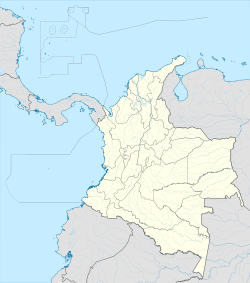Fúquene
Fúquene | |
|---|---|
Municipality and town | |
 Park in Fúquene | |
 Location of the municipality and town inside Cundinamarca Department of Colombia | |
| Coordinates: 5°24′18″N 73°47′45″W / 5.40500°N 73.79583°W | |
| Country | |
| Department | |
| Province | Ubaté Province |
| Founded | 6 November 1638 |
| Founded by | Gabriel Carvajal |
| Government | |
| • Mayor | Oscar Fredy Rojas Briceño (2016-2019) |
| Area | |
| • Municipality and town | 90 km2 (30 sq mi) |
| Elevation | 2,750 m (9,020 ft) |
| Population (2015) | |
| • Municipality and town | 5,617 |
| • Density | 62/km2 (160/sq mi) |
| • Urban | 263 |
| Time zone | UTC-5 (Colombia Standard Time) |
| Website | Official website |
Fúquene is a municipality and town of Colombia in the department of Cundinamarca. The municipality borders Ubaté, Susa, Guachetá and the department of Boyacá. Fúquene is located 116 km northwest from the capital Bogotá.[1]
History[edit]
Fúquene, in the north of the present department of Cundinamarca, was in the centuries before the Spanish conquest inhabited by the Muisca. The village was located in the border region of the northern Muisca territories, ruled by the zaque of Hunza, the southern Muisca area with the zipa based in Bacatá and the independent territories in the northwest. A lake within the boundaries of Fúquene, Lake Fúquene was considered a sacred site in the religion of the Muisca.[2]
With the arrival of the Spanish conquistadores many indigenous people fled to an island in Lake Fúquene.[1] Modern Fúquene was first established by one of the few female founders in 1542, Teresa de Verdugo. The town was properly founded on November 6, 1638, by Gabriel Carvajal.[1]
Etymology[edit]
The name Fúquene is either derived from the Chibcha words fú and quyny, meaning "bed of the fox", or named after the god Fu, who inhabited the lake defending the terrain against the Muzo; "bed of Fu".[1]
Economy[edit]
Main economical activities of Fúquene are livestock farming and agriculture, mainly potatoes, tomatoes, maize and fruits as strawberries.[1]
References[edit]
- ^ a b c d e (in Spanish) Official website Fúquene Archived 2019-06-16 at the Wayback Machine - accessed 05-05-2016
- ^ Ocampo López, Javier (2007). Grandes culturas indígenas de América [Great indigenous cultures of the Americas] (in Spanish). Bogotá, Colombia: Plaza & Janes Editores Colombia S.A. p. 226. ISBN 978-958-14-0368-4.



